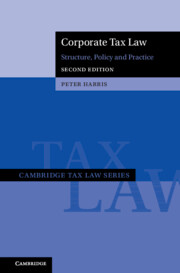Book contents
- Corporate Tax Law
- Cambridge Tax Law Series
- Corporate Tax Law
- Copyright page
- Contents
- Preface
- Abbreviations
- Introduction
- 1 Taxation of Corporate Income When Derived
- 2 Taxation of Corporate Income When Distributed
- 3 Taxation of Corporate Income
- 4 Creating Share Interests
- 5 Transferring Share Interests
- 6 Terminating Share Interests
- 7 Varying Share Interests
- 8 Dividend and Capital Stripping and Value Shifting
- References
7 - Varying Share Interests
Published online by Cambridge University Press: 29 February 2024
- Corporate Tax Law
- Cambridge Tax Law Series
- Corporate Tax Law
- Copyright page
- Contents
- Preface
- Abbreviations
- Introduction
- 1 Taxation of Corporate Income When Derived
- 2 Taxation of Corporate Income When Distributed
- 3 Taxation of Corporate Income
- 4 Creating Share Interests
- 5 Transferring Share Interests
- 6 Terminating Share Interests
- 7 Varying Share Interests
- 8 Dividend and Capital Stripping and Value Shifting
- References
Summary
This chapter considers the change of an existing share interest in some form. There is a realisation event, either by issuing, transferring or terminating share interests. The change can be by substitution, such as on the exercise of options or convertible notes. It might be by way of splitting and here the focus is on the tax treatment of bonus shares or stock distributions. It can also be by way of consolidation. All of these corporate reconstructions raise the issue of whether the investor’s interest in the corporation has changed sufficiently to justify the imposition of tax consequences. Similar issues arise where more than one corporation is involved in the change. So, in a corporate merger, a shareholder in the target may exchange their shares in return for shares in the bidder. Consideration is given to mergers by fusion and mergers by share exchange. Such mergers raise change of ownership issues (Chapter 5) similar to those raised in the context of a cash takeover. Demergers involve the splitting of a business or subsidiary from the holding corporation, and this can result in the investor holding two sets of shares post demerger. Issues raised are similar to for bonus shares.
Keywords
- Type
- Chapter
- Information
- Corporate Tax LawStructure, Policy and Practice, pp. 564 - 612Publisher: Cambridge University PressPrint publication year: 2024



